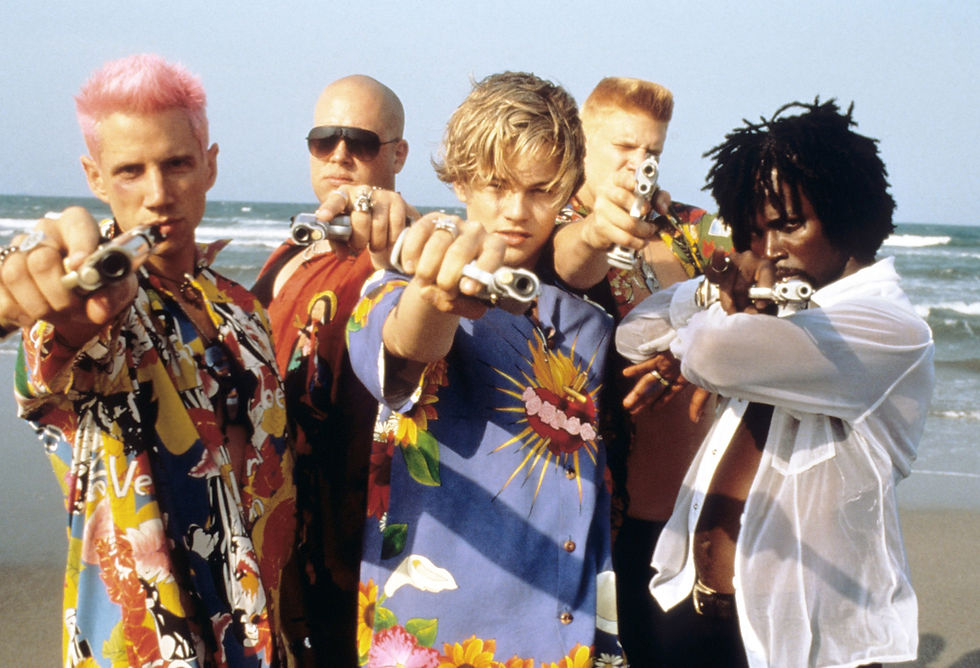Romeo & Juliet '96 Is Exactly What Shakespeare Would've Wanted
- Malana Lane-Topham
- Feb 20, 2023
- 3 min read
Notoriously maximalist director Baz Luhrmann has recently been the talk of the town - or more accurately the world - with his take 2022 on the life of Elvis Presley in the new, shiny biopic, aptly titled Elvis.
But it was his second feature film, the 1996 adaption of Shakespeare's tragedy that made him a household name; winning three BAFTAs in direction, music and screenplay. However, the jury of critics were out on how much they liked the film, with highly-respected critic Rodger Ebert calling it 'a mess', while Rotten Tomatoes heralded it as 'fresh and inventive'.

Critics aside, it was undoubtedly a whole new way to approach Shakespeare. Where previous film adaptions such as Zeffirelli's 1968 Romeo and Juliet stayed as true to the text as possible, some adaptions, most notably West Side Story borrowed the basic plot and transported it to a contemporary setting, fit with contemporary dialogue and issues, to the point where a viewer totally unfamiliar with Shakespeare would remain blissfully unaware that they were watching a musical of Romeo and Juliet. Luhrmann marries the two styles of adaptation in his 1996 film, where the music, costumes and settings are all updated, but the dialogue and plot remain loyal to the play.
Luhrmann's take on Verona becomes Verona beach; a sun-soaked landscape covered in enough neon lights to outshine Vegas - the Montagues and Capulets are entrenched in a gang war consisting of young men running around in unbuttoned Hawaiian shirts with pistols and ecstasy, and Claire Danes' Juliet first meets her star-crossed lover through a fish tank at a costume party. Everything about the film is dynamic and exciting, to the point where, despite sharing all of its dialogue with Shakespeare's original, it is almost unrecognizable. The characters pulse with energy and emotion - with one of the most iconic scenes of the film being young Leo screaming at the sky and falling to his knees on a desert landscape; a performance so melodramatic it could easily be placed onstage in The Globe and still exude so much intensity that it bounces off the walls.
The adaption is often looked down on as simply pandering to young audiences at the time, and even now in 2023, when a secondary school class groan over their Shakespeare textbooks, its the promise of seeing Leo DiCaprio and his curtains that make them sit up straight in their seats and pay attention, which has lead to the film being regarded as Shakespeare for teens. However, Luhrmann's intention was never to pander to bored teenage students. It was to emulate Shakespeare himself.

"What I wanted to do was to look at the way in which Shakespeare might make a movie of one of his plays if he was a director. How would he make it? We don't know a lot about Shakespeare, but we do know he would make a 'movie' movie. He was a player. We know about the Elizabethan stage and that he was playing for 3000 drunken punters...so he was a relentless entertainer and a user of incredible devices and theatrical tricks to ultimately create something of meaning and convey a story. That was what we wanted to do." - Luhrmann for Signet, 1996.
Luhrmann's adaptation stayed truest to the original intention of what a play is meant to be - entertainment. Romeo and Juliet was performed originally for the Elizabethan public - from the lowest to the highest of classes. While the medium of film allows for much quieter, intimate looks at romance than the stage does, Shakespeare wrote dialogue that was meant to soar and strike the viewer right in the heart; and when Leo dropped to his knees in the dust in 1996, there was not a single soul untouched in my Year 8 classroom.







Comments